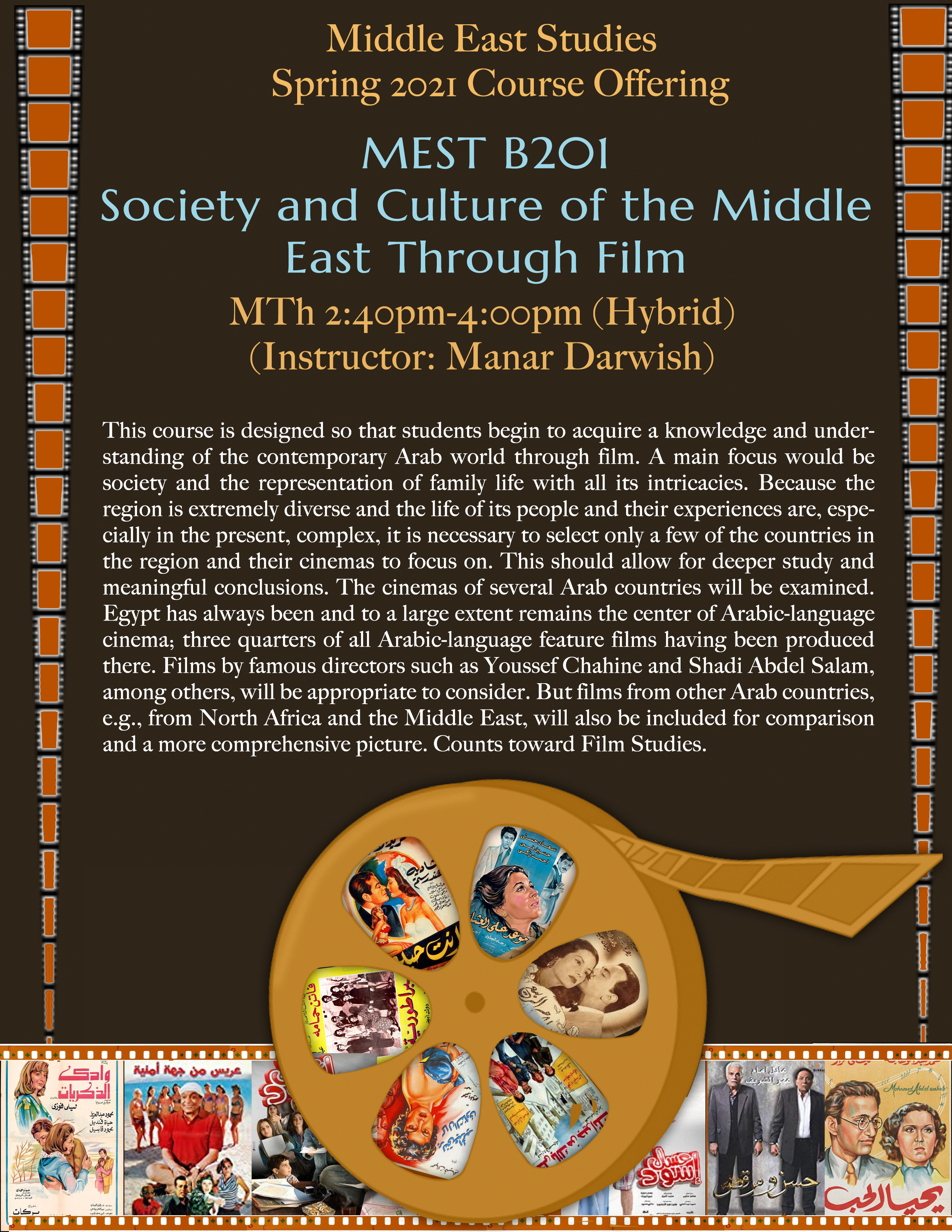
This course introduces students to the interdisciplinary field of Middle Eastern Studies with a focus on the analytical approaches, methods, and tools used by specialists of the area. Students will become familiar with the dynamics of the region in the premodern and modern periods and the major issues and debates that dominate the various disciplinary approaches to the study of the Middle East. There will be a special emphasis on the disciplinary approaches used by scholars at Bryn Mawr and Haverford, including the History of Art, Political Science, Near Eastern Archaeology, Languages and Literature, Anthropology, Religious Studies, and History. Readings will include both canonical and alternative works in Middle Eastern Studies to examine the limits and possibilities of the field. This course will also feature visits by leading scholars from the Middle East Studies faculty at Bryn Mawr and Haverford who research and write on this region.
- Instructor of record: Rubina Salikuddin
Instruction Mode: Hybrid: In-Person and Remote
Class Meeting Dates and Times: Wednesdays 7:10-10:00 pm

This course is designed so that students may begin to acquire a knowledge and understanding of the contemporary Arab world through film. The course will aim to examine society, including such topics as development, nationalism, religion, relations between Muslims and Christians, the portrayal of women, and the representation of family life with all its intricacies. All this will be considered in the light of existing censorship with its supposed purpose of keeping national harmony. This will allow us to study several of the more prominent directors and how they were able to deal with sensitive topics and get their message across while at the same time walking the fine line between appeasing the government and appealing to the people. Because the region is extremely diverse and the life of its people and their experiences are, especially in the present, complex, it is necessary to select only a few of the countries in the region and their cinemas to focus on. This should allow for deeper study and more meaningful conclusions. Egypt has always been and to a large extent remains the center of Arabic-language cinema; three quarters of all Arabic-language feature films having been produced there. Because it is the largest producer of movies and television programs in the region and all other Arabic-speaking people have grown up watching those movies and programs, Egypt’s culture continues to have a tremendous influence on the other Arab countries. But cinema in other Arab countries has now been on the rise as well for some decades, so films from several of those countries, including Lebanon, Saudi Arabia, Jordan, and Tunisia, will also be assigned for comparison and a more comprehensive picture. Films assigned for this course will be in Arabic as the main language, but all the ones that we will view in full for analysis and study will have English subtitles throughout.
The Arab world’s contemporary culture is a product of multitudes of developments and influences that its people have continuously lived through and experienced. Life there, especially in the large metropolitan centers, such as Cairo and Beirut, encompasses the latest ideas and trends that sweep through the region. This course will seek to help students understand some major aspects of the life and culture of modern-day Arabic speakers. Through watching various films and discussing different directors and their work in detail, we will touch upon the many historical, political, and economic forces that have shaped the culture of the region.
By studying the portrayal of the contemporary Arab world in film, students can begin to gain a deeper understanding of Arab culture and society. Meanwhile, students will be able to reflect upon, compare and contrast what they are studying in class with what they know, including their own culture and other cultures they are familiar with, as well as information derived from media portrayals of Arab culture. Altogether, this course will enable students to expand their horizons, exposing them in depth to a culture other than their own.
The Arab world’s contemporary culture is a product of multitudes of developments and influences that its people have continuously lived through and experienced. Life there, especially in the large metropolitan centers, such as Cairo and Beirut, encompasses the latest ideas and trends that sweep through the region. This course will seek to help students understand some major aspects of the life and culture of modern-day Arabic speakers. Through watching various films and discussing different directors and their work in detail, we will touch upon the many historical, political, and economic forces that have shaped the culture of the region.
By studying the portrayal of the contemporary Arab world in film, students can begin to gain a deeper understanding of Arab culture and society. Meanwhile, students will be able to reflect upon, compare and contrast what they are studying in class with what they know, including their own culture and other cultures they are familiar with, as well as information derived from media portrayals of Arab culture. Altogether, this course will enable students to expand their horizons, exposing them in depth to a culture other than their own.
- Instructor of record: Manar Darwish
